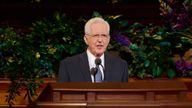24 August 2025
What does worshipping God mean for you and me?

Sacrament Meeting Program
Presiding: Bishop St. Felix
Conducting: Bishop St. Felix
Opening Hymn: #64 - On this Day of Joy and Gladness
Invocation: By Invitation
Ward Business
Sacrament Hymn: #171 - With Humble Heart
Administration of the Sacrament
Speaker: Oliver Balmforth
Speaker: Brayden Jakins
Intermediate Hymn: #249 - Called to Serve
Speaker: Jared Briscoe
Closing Hymn: #303 - Keep the Commandments
Benediction: By Invitation
Messages From General Conference
Worship
By Elder D. Todd Christofferson
Of the Quorum of the Twelve Apostles
One of the most common and important forms of worship is to gather in a consecrated space to perform acts of devotion. The Lord says, “And that thou mayest more fully keep thyself unspotted from the world, thou shalt go to the house of prayer and offer up thy sacraments upon my holy day.” This is, of course, our primary motivation in building chapels. But, if necessary, a non-dedicated space will do if we can invest it with some degree of sanctity.
Most important is what we do when we gather on the Lord’s day. Of course, we dress as best we can according to our means—not extravagantly but modestly in a way to signal our respect and reverence for Deity. Our conduct is similarly reverent and respectful. We worship by joining in prayer; we worship by singing hymns (not just listening to but singing the hymns); we worship by instructing and learning from one another. Jesus says, “Remember that on this, the Lord’s day, thou shalt offer thine oblations [meaning thine ‘offerings … of time, talents, or means, in service of God and fellowman’] and thy sacraments unto the Most High, confessing thy sins unto thy brethren, and before the Lord.” We come together not to entertain or be entertained—as by a band, for instance—but to remember Him and be “instructed more perfectly” in His gospel.
At the most recent general conference, Elder Patrick Kearon reminded us that “we do not gather on the Sabbath simply to attend sacrament meeting and check it off the list. We come together to worship. There is a significant difference between the two. To attend means to be present at. But to worship is to intentionally praise and adore our God in a way that transforms us!”
Devoting our Sabbaths to the Lord and His purposes is itself an act of worship. Some years ago, then-Elder Russell M. Nelson observed: “How do we hallow the Sabbath day? In my much younger years, I studied the work of others who had compiled lists of things to do and things not to do on the Sabbath. It wasn’t until later that I learned from the scriptures that my conduct and my attitude on the Sabbath constituted a sign between me and my Heavenly Father [see Exodus 31:13; Ezekiel 20:12, 20]. With that understanding, I no longer needed lists of dos and don’ts. When I had to make a decision whether or not an activity was appropriate for the Sabbath, I simply asked myself, ‘What sign do I want to give to God?’”
Worship on the Lord’s day is marked by a particular focus on the great atoning sacrifice of Jesus Christ. We appropriately and specially celebrate His Resurrection at Easter but also every week as we partake of the sacramental emblems of His Atonement, including His Resurrection. For the penitent, partaking of the sacrament is the highlight of Sabbath worship.
Worshipping together as “the body of Christ” has unique power and benefits as we teach, serve, and sustain one another. Interestingly, one recent study found that those who view their spiritual lives as entirely private are less likely to prioritize spiritual growth, or to say their faith is very important, or to have regular devotional time with God. As a community of Saints, we strengthen each other in worship and in faith.
Even so, we cannot forget the daily acts of worship that we engage in individually and at home. The Savior reminds us, “Nevertheless thy vows shall be offered up in righteousness on all days and at all times.” One sister wisely observed, “I cannot think of a more profound way to worship God than to welcome His little ones into our lives and care for them and teach them His plan for them.”





